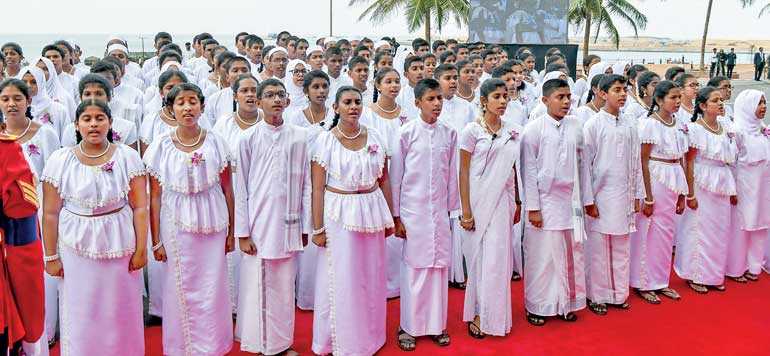Friday Feb 20, 2026
Friday Feb 20, 2026
Tuesday, 2 February 2021 00:04 - - {{hitsCtrl.values.hits}}

The singing of the National Anthem in both the Sinhala and Tamil languages is in accordance with the recommendation of the Lessons Learnt and Reconciliation Commission appointed by Prime Minister Mahinda Rajapaksa in 2011 when he was president
By National Peace Council
The singing of the National Anthem became a matter of controversy last year at the National Independence Day celebration when it was sung only in Sinhala and not in both the official languages as it had been sung in the previous years in keeping with the national reconciliation process.
The singing of the National Anthem in both the Sinhala and Tamil languages is in accordance with the recommendation of the Lessons Learnt and Reconciliation Commission appointed by Prime Minister Mahinda Rajapaksa in 2011 when he was president.
The National Anthem, like other national symbols of a country, should represent the tradition, history, and beliefs embedded in the country, its society and its people. Singing it together will help to evoke feelings of patriotism among the country’s citizens irrespective of ethnicity and religion and remind them of their country’s history, diversity, and rich cultural heritage, as the words of our National Anthem convey. Those in the majority should have the magnanimity to accommodate the minority to encourage their sense of belonging.
The point about reconciliation is to find unifying factors. Singing the National Anthem in a language that all can understand is an act of unity. The National Peace Council believes that this coming Independence Day Celebration will be an opportune moment for the Government to publicly demonstrate its commitment to the reconciliation process to the people of Sri Lanka and the international community by having the National Anthem sung again in both official languages. Sustainable peace is pleasing all communities and not victory to anyone.
As one of the lessons learnt from the past, and in keeping with the reconciliation process, the National Peace Council calls on the Government to take up this issue of the National Anthem and the languages in which it is sung as it affects the sense of dignity, equality and belonging of those who are Tamil-speakers.
The importance of symbolic acts of reconciliation at the present time is heightened by the fact that Sri Lanka is currently facing international strictures by the Office of the UN High Commissioner for Human Rights for failing to implement the commitments on reconciliation made by Government representatives over the past several years.
The National Peace Council is an independent and non partisan organization that works towards a negotiated political solution to the ethnic conflict in Sri Lanka. It has a vision of a peaceful and prosperous Sri Lanka in which the freedom, human rights and democratic rights of all the communities are respected. The policy of the National Peace Council is determined by its Governing Council of 20 members who are drawn from diverse walks of life and belong to all the main ethnic and religious communities in the country.